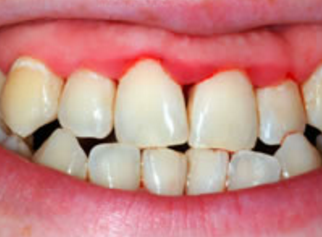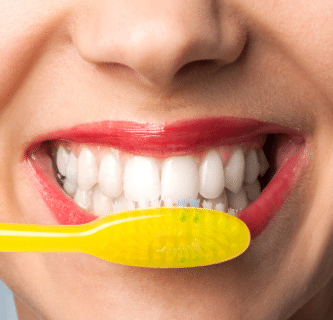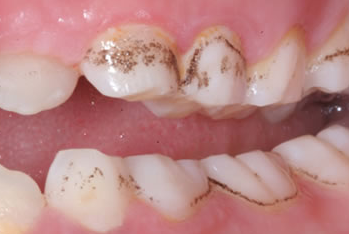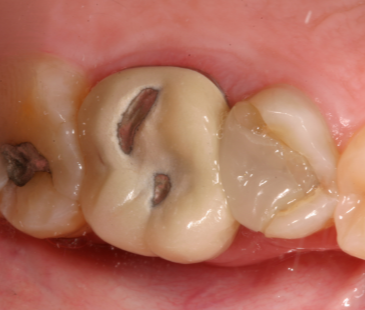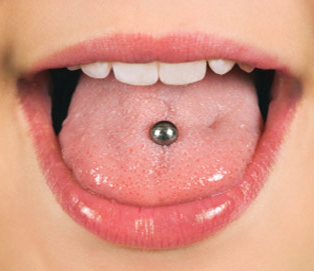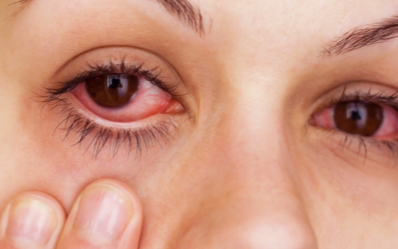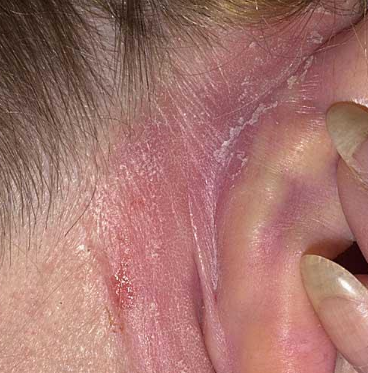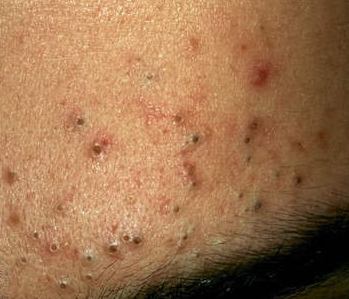A closer look on the inflamed gums, swollen, infected, bleeding, sore, painful, with braces, treatment, home remedy as well pictures.
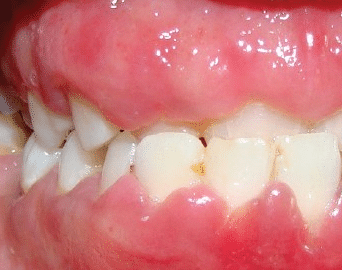
inflamed gums
Inflamed Gums
Gingivitis is the usual cause for red, swollen and inflamed gums, but don’t be very quick to point the finger. In some other cases it may not be the gum disease, but other related sensitivities that leads to painful gums without any bleeding that follows.
The first step to finding a relief is to pinpoint the reason for the swelling. Whether it’s the result of the gingivitis or a similar issue, knowing how to get rid of swollen gums implies understanding what could be affecting you in the first instance. Consider the following causes of the sore gums, and how to treat the pain so that you can find lasting relief:
Gingivitis
Gingivitis is an infection of the tissue that surrounds the teeth leading to swollen gums more often than not, but it can lead to bleeding as well. Just because the gums may not be bleeding, doesn’t mean you should rule out a gum disease altogether; the doctors estimate that about 47 percent of American adults suffer from inflamed gums.
Some other symptoms of the gingivitis are the gums pulling away from the teeth, persistent bad breath as well as even loose teeth. If you suspect that gingivitis is leading to your red, sore gums, be sure to visit the dentist.
Pregnancy
The doctors further warns that some pregnant women can experience red, swollen gums during gestation. Pregnancy hormones alter the way the body reacts to the bacteria, making this the perfect time for a plaque to build up and the gums to become sensitive. Women in their second trimester are prone to the dental issues, so it’s important to maintain a regular dental checkups and reminding the dentist each time that you’re pregnant.
Malnutrition and Illness
Certain medical conditions can lead to sore gums, too. Illnesses that attack the immune system, and also the malnutrition and even the chronic stress, can be very damaging to the gum health. The dentists also suggests that autoimmune disorders affect the white blood cells – also called autoimmune neutropenia – it can lead to tender gums without much bleeding.
A low amount of vitamin C intake -female and male adults should have between about 75 to 90 mg of vitamin C a day, respectively, according to the dentists can also lead to this type of inflamed gums.
Dental Appliances
Recent fittings for the braces, dentures or another dental appliance are the classic reasons for the sore or swollen gums. The mouth is an inherently sensitive area of the body, and it doesn’t always respond to the foreign objects favorably. In some other cases, the swelling will go down as you become used to the appliance, but if it can continue to bother you, it can be a sizing issue to discuss with the dentist or orthodontist.
Inflamed Swollen Gums or Gum swelling
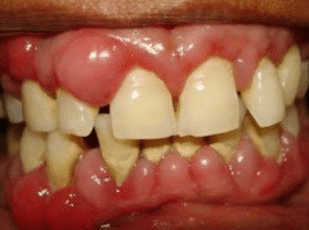
swollen gums
More than three-quarters of the American adults over age of 35 get periodontal disease. While most of the people with gum disease have the less severe form of inflamed gums, known as gingivitis, between 10% and 15% have a much serious type of gum disease known as periodontitis.
When people don’t practice good dental hygiene, bacteria in the mouth forms a plaque on the teeth. These bacteria may lead to the gums to become inflamed, which leads to in red, swollen, or even bleeding gums.
For most of the people who have gingivitis, this inflammation is not painful. If you catch gingivitis early, it can be as well be reversed and healed using proper oral hygiene. But left untreated, gingivitis might worsen and eventually cause tooth loss. Be sure to seek proper medical attention if you experience the following symptoms, even if you don’t have any discomfort:
- changes in the way teeth fit together on biting
- formation of the deep pockets between teeth and the gums
- gums that bleed during and after tooth brushing
- loose or even shifting teeth
- persistent bad breath or bad taste in the mouth
- receding gums
- red, swollen, or even tender gums
When gingivitis continues, it then develops into periodontitis, a condition where the gums and bone that hold the teeth in place might be severely weakened. The bacteria on the teeth release toxic substances that harm your gums and cause them to become infected.
The infection and inflamed gums result when your body attacks the bacteria can degrade your gums and the bone in your jaw even further. You may have exceptionally swollen, painful gums that are likely to bleed. If left untreated, periodontitis can lead to tooth loss.
Gums Hurt or Painful Gums
The longer plaque and tartar are on teeth, the more the harmful they will become. The bacteria leads to inflammation of the gums that is called gingivitis. In gingivitis, the gums become red, swollen and also can bleed very easily.
Gingivitis is a mild form of a gum disease that may normally be reversed with the daily brushing and flossing, as well as the regular cleaning by a dentist or even dental hygienist. This form of gum disease does not include any form of loss of bone and tissue that hold teeth in place
Trench mouth is a painful form of gum swelling. The mouth normally has a balance of different bacteria. Trench mouth happens when there is an overgrowth of the normal mouth bacteria. The gums become infected and then develop painful ulcers. Viruses can be involved in allowing the bacteria to grow too much.
Risks are the following:
- Emotional stress
- Poor oral hygiene
- Poor nutrition
- Throat, tooth, or mouth infections
This disorder is very rare. When it does happen, trench mouth normally affects persons ages between 15 to 35.
Inflamed Bleeding Gums
Bleeding gums are often a sign of gum disease, but may also point to a number of other health problems.
Occasional bleeding of the gums can be the result of the brushing teeth too vigorously or even wearing dentures that don’t fit perfectly. Frequent episodes of the gum bleeding, but, can indicate a more serious conditions, like:
- periodontitis (an advanced form of the gum disease)
- leukemia (which is the cancer of the blood)
- vitamin deficiency
- lack of clotting cells (platelets)
Periodontal disease, can happen when gingivitis continues to an advanced level. Periodontal disease is the infection of the gums, and supportive tissues that connect the teeth and gums. Periodontitis can cause the teeth to loosen or even fall out.
Deficiencies of vitamins C and K can also lead to gums to bleed easily. But, vitamin deficiencies aren’t normally seen in people who live in developed countries, according to the studies. This is because healthy children and adults living in the developed areas of the world have access to vitamins C and K through the food and supplements.
Ask your doctor to check your levels of vitamin C and vitamin K if you encounter bleeding gums that aren’t brought about by improper dental care. Follow a diet that has both of the nutrients to ensure that you’re getting the vitamins you need to stay healthy.
Pregnancy is a common cause of the gum bleeding in women. The hormonal changes that happen during pregnancy can cause the gums to become more sensitive.
Bleeding disorders, like hemophilia and leukemia, can also increase the chance of bleeding gums. Your gums might bleed often if you take blood-thinning medications. Drugs in this class are the ones that have warfarin, aspirin, and heparin.
The dentist may also instruct you to use an antiseptic mouthwash so as to minimize the plaque that forms in the mouth. A rinse of warm salt water can assist to soothe swollen gums that bleed much easily.
Use a soft toothbrush that is gentle on inflamed gums, more especially if you have a bleeding after brushing the teeth. Medium and hard bristles can be too abrasive for the delicate gums. You can also consider using of an electric toothbrush. The specially designed brush heads on the toothbrushes can help you to clean the gum line more easily than a manual toothbrush.
Inflamed Gums with Braces
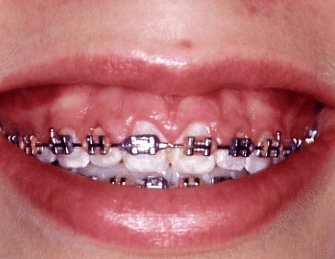
swollen gums with braces
When receiving orthodontia for straighter teeth, you can find swollen gums with the braces come with the territory. You can also worry when the swelling is more pronounced than you expected, and wonder when to find relief from the discomfort. But rest assured that the irritation or soreness when you first get braces is very normal.
Nonetheless, swollen and inflamed gums especially after a long period of no pain – can be an indication of other problems. Take a look at what can lead to swollen gums when wearing the corrective appliances, and how to care for it.
It’s very normal to feel some pain in the mouth after receiving new braces or even regular adjustments. The teeth and jaw are hard at work creating a new smile: Bone dissolves and the new bone is formed as the teeth are repositioned, and this can lead to tension and pressure, according to doctors.
The discomfort is very normal when you first get braces or have them tightened, and it can last for about two to three days. But swollen gums over time may point to problems unrelated to the initial wear.
Inflamed Gums Home Remedy
Swelling of the gums is a very common problem. The tissue that forms the gums is too thick, fibrous and full of blood vessels. Hence, when there is a swelling, the inflamed gums can protrude or even bulge out and appear red instead of the normal pink.
This can lead to the gums to be irritated, sensitive and painful. The gums also can bleed more easily when brushing or flossing your teeth.
Gum swelling may be due to a number of issues, like gingivitis, infection, nutritional deficiencies or even pregnancy.
Other common causes are poorly fitting dentures or even other dental appliances, excessive smoking or even use of other tobacco products, sensitivity to the toothpaste or even mouthwash, an injury or an incorrect brushing or flossing techniques.
You might soothe the pain and swelling of the gums using proper oral hygiene as well as home remedies. But, if you have swollen gums and the symptoms persist for more than about two weeks, see the dentist.
Here are the home remedies to reduce gum swelling;
- Warm and Cold Compresses
Warm and cold compresses may provide quick relief for the sore, swollen gums as they assist to reduce pain and swelling. You are required to hold the compresses against the face, not directly on the swollen gums.
- Soak a clean cloth in warm water and wring out the excess liquid.
- Hold the cloth against the face for about 5 minutes.
- Next, wrap a bag of frozen peas in a very thin towel and hold it against the face until the area becomes a bit numb.
- Repeat the cycle for about 2 or 3 more times.
- Use the remedy as needed.
- Salt Water
Salt is also another effective remedy for the swollen inflamed gums. It inhibits growth of bacteria in the mouth and prevents infections that can contribute to several oral health issues.
- After brushing the teeth with a soft-bristle toothbrush, gently rub the gums with salt for a few seconds. Rinse it off using warm water. Do the process once daily. After the gums are healthy again, do it 3 times a week to prevent recurrence.
- Another option is to add about 1 teaspoon of salt to a glass of lukewarm water and apply it to rinse the mouth twice daily until the swelling subsides.
- Hydrogen Peroxide
Hydrogen peroxide can also assist to reduce gum inflammation and pain. It can even assist to kill germs and fight off oral problems. For oral health, use food grade, the 3 percent hydrogen peroxide solution only.
- Mix equal parts of 3 percent hydrogen peroxide solution and water. Swish the solution around the gums and teeth for about 30 seconds. Rinse it off using warm water.
- Mix 1 teaspoon of baking soda with enough hydrogen peroxide so as to make a paste. Rub this paste on the gums, wait for about 1 minute and then rinse your mouth thoroughly with water.
Use either of these treatments 2 or 3 times a week.
Make sure you do not swallow hydrogen peroxide.
- Turmeric
Turmeric is also a good home remedy for the swollen and inflamed gums. It has curcumin that has antioxidant and anti-inflammatory properties that can assist reduce pain, swelling and inflammation. In addition, it prevents the spread of the bacterial activity that leads to several oral problems.
- Mix about teaspoon of turmeric powder with a little water to make a paste.
- Apply the paste on the gums with your clean finger.
- Leave it on for about 5 minutes, then massage gently for 1 minute.
- Rinse the mouth using warm water.
- Repeat the process twice daily for 1 to 2 weeks.
- Black Tea Bags
Black tea bags contains tannins that can assist reduce inflammation of the gums. In addition, its antioxidant properties is for a good oral health.
- Steep a tea bag in boiling water for about 2 to 3 minutes.
- Remove it and allow it to cool to a skin bearable temperature.
- Hold the tea bag on the affected area of the gums for about 10 to 15 minutes.
- Rinse the mouth with a warm salt-water solution.
- Repeat the process once daily for a few days.
- Aloe Vera
Another effective remedy that can be used to treat swollen and inflamed gums is aloe vera. This herb contains anti-inflammatory and antibacterial properties that can prevent the growth of plaque-causing bacteria in the mouth and soothe inflamed gums.
- Cut open an aloe vera leaf to get the gel.
- With a clean finger, rub the gel on the gums.
- Gently massage for about 1 to 2 minutes.
- Rinse using warm water.
- Repeat a few times daily until there is improvement in the condition
Inflamed Gums Treatment
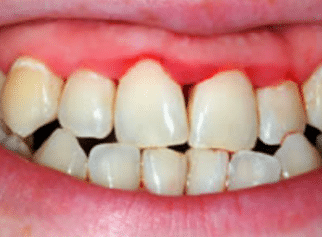
inflamed bleeding gums
Some medications like Dilantin, phenobarbital or even calcium channel blockers indicate swollen, sore gums as a side-effect. Consider whether or not you’ve started a new type of medication; it might be the reason for swelling and pain without any bleeding.
Keep in mind that the irritated gums don’t need constant attention, more especially when treated at the source. No matter which of the causes applies to you, here are some of the tips as you learn how to treat the swollen gums so that you can begin the healing process:
Treat the Source
Some causes of the inflamed gums, including medications and illness, will require to be treated with more comprehensive medical care. See a dentist for a regular checkup and he or she can refer you to this health care professional.
Or, if you just started taking a new medication and then notice gum pain creep in, talk to the doctor about the alternatives, or even altering dosage. When gum disease is the culprit, talk to a dentist about the home-care practices that may bring back healthy, pain-free gums – like brushing correctly and also flossing every day.
Take Anti-Inflammatory Medication
Because inflammation may aggravate the nerves in the jaw, much of the pain associated with the sore gums is actually due to the swelling itself. Taking an anti-inflammatory medication including acetaminophen or ibuprofen can assist you to find relief in the interim so you don’t incur further damage before seeing the doctor or dentist.
Eat Cold Foods
Provided the sensitivity hasn’t spread to your teeth, cold foods can assist to reduce swelling and numb the pain of swollen gums. Thus, try noshing on a freezer pop or even eating a few frozen grapes to assist calm the pain and swelling naturally.
Try Benzocaine
A product that has benzocaine, such as Colgate Orabase 20% Benzocaine, can be used topically to give a numbing relief from the inflamed gums. Although it’s only a temporary solution, it can assist to soothe painful gums so you have the time and focus to treat one of the five true causes of the swelling.
Swollen gums may definitely be a pain, but you shouldn’t have to keep altering the home care to address the problem. Once you’ve found the issue, you can work to solve it while finding ways to assist cope with the pain until you’re better.
Further references;
- What Swollen Gums With Braces Means For Your Oral Health: http://www.colgate.com/en/us/oc/oral-health/cosmetic-dentistry/adult-orthodontics/article/what-swollen-gums-with-braces-means-for-your-oral-health-1015
- Dental Conditions That Can Cause Bleeding Gums: http://www.healthline.com/symptom/bleeding-gums
- Trench mouth: https://medlineplus.gov/ency/article/001044.htm

